
One of the things that has occupied my thinking recently, is the idea of how enclosed narrative has become by the rigid cliches and structural limits of corporate produced film & TV. One can feel the desire to break away from this in the expanded narrative form of certain otherwise kitsch shows such as The Sopranos or Homeland, The Killing, or Breaking Bad. The network formula of the one hour form that stands alone as a narrative with a beginning and end was being challenged to some degree by simply allowing each one hour installment to be part of a season long narrative. The experience felt much more liberating than it actually was, of course.
This inevitably leads to thoughts about photography and serial photographic essays. Blake Stimson wrote that film (in comparison to a composition of still photographs) is, because of its eighteen or twenty four frames a second (and how digital affects this is a whole other question) is inescapably beholden to a rigid expository structure. One image after another after another after another. It systematizes and structures ‘life itself in all its multiplicity, diversity, and contingency’ (Mary Anne Doane), and in so doing is creating an ideological role representing an outside, and a relation to time itself that serves a perception of social stability. And unity.

In corporate film (and perhaps in all film) the audience is presented with a pre-fabricated index of experience, and taught how to perceive time. As Adorno said (and Stimson quotes him in this):
“The less dense reproduction of reality in naturalistic literature left room for intentions: in the unbroken duplication achieved by the technical apparatus of film every intention, even that of truth, becomes lie.”
This is a complicated topic, and I wanted to only touch on one element of it. The mystery of the photograph is changed in film into another sort of mystery, but not without first removing that first register of mystery altogether. The technical is foregrounded in film in a way quite separate and different than the photograph (or painting). The missing element in this discussion is theatre (as it often seems to be, for some reason). In any event, the preponderance of film and TV product has now so entrenched certain relationships of time and space, and of social conventions, that the viewer can comfortably anticipate events, and even the camera angles that will be used.
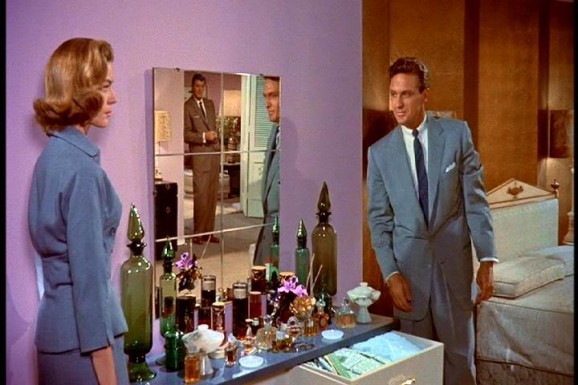
Written on The Wind, dr. Douglas Sirk, 1956
The sense of the expository in film is a topic that has elicited a good deal of analysis, and I’m not at all sure of the final reasons for it, but it’s hard not to feel the truth of this postulate. The sense in which film follows on from the 19th century novel has led to the formation of the ‘cinematic real’. How extensive is the reach of this construction, psychically, is hard to say, but I do think the sheer volume of product now, the 24 hour a day, 7 day a week, constant of screened narrative has somehow intruded and deeply effected the mental make-up of most people in the West (and maybe, really, in the world). However, the untruth of corporate marketing as it exists in almost all studio and network film and TV, is really what I wanted to look at — especially in relationship to theatre. The problem for theatre, today, is that almost everything being done in theatre (in the United States anyway) is simply movie reality transferred to the stage. But not the movie reality of a Sirk or Nick Ray, or Fassbinder or Pasolini or Rivette or Godard or Antonioni — or dozens of others — but the pure marketed kitsch of studio product over the last twenty five years, say. Or perhaps even more insidiously, the TV hour drama. Network television is so encrusted with a sense of its own history (as history per se) and with formulas, that the rhythms and sense of space has narrowed drastically, and the conceptual … ideas of ‘fact’ and ‘reality’ are condensed into very simple sub-sets of these few well honed narratives. Of course the police procedural now is so well established, so absorbed into daily discourse, that people’s sense of life is stultified and reduced and what is anticipated at any moment during the day. For a large number of people, and maybe everyone to a degree, there is the same anticipation one experiences in knowing the next camera angle and edit.

I suspect all of us are affected. Some more, some less. But our very language is debased by this endless screening, this constant background noise, both visual and aural. Deleuze has written about a shift in cinema, from ‘movement image’ to ‘time image’. Without getting into that, the relevant aspect of this relates to floating away from linkage between images, to an experience more connected to the cut or edit itself. For the purpose of this discussion, that shift is partly the result, I suspect, of studio and network narratives recycling their own histories. The same story told with new cosmetics, new decor. The sameness is partly what is being anticipated, as a category. It is the same linkage and it is the same non-linkage. The story is given, already known, already seen, and it’s only the actors and set that change, and then only slightly. Gradually, the formula is made subsidiary to the interruptions — and it is within the interruption that resides, I think, a sense of what was once offstage.

I Love Lucy, 1951-1957
The sense of living on a set, in a 3 camera world view, intersects with the various unconsciously digested spaces of the permanent workplace set, friends as recurring characters, and the world at large, consequently, a far off 60 Minutes Special Report. These are crude models for what is, actually, an infinitely complex set of associations and processing of cues. A banal example of a part of this is how we look at a clock and relate the “time” as something structured in our lived experience. In fact, one of the things theatre does, almost without author or director trying, is de-stabilize exactly this sort of curious trivilization of subjective duration. The police and military as institutional truths are prominent today to a degree that defies a real grasp conceptually, it is just too monumental. The sense of ‘authenticity’ is now so mired in reality show codes that clearly actual soldiers and cops are acting learned roles modeled on their favorite police procedural or on Army Wives or the like.
The fact that studio film and network TV define history as the history of their own medium, the viewer accommodates his or her own sense of history to these same abbreviated set of motivations and explanations. For in kitsch TV or film, everything is explanation. But it is more than this, of course, it is universalizing an idea about ‘fact’, and really, universalizing the factual as authority — science is built into the very apparatus that puts these narratives on the screen. And those narratives, those images, are very standardized. The explanations are so reductive as to be almost delusional. An entire world view based on a supreme rationality, a militarized sense of authority that is reinforced constantly as of the highest moral value, is linked directly to this manufactured sense of time and space as seen on TV. We anticipate as we enter our own homes, and we probably edit in our heads how to shoot our walk to the kitchen, etc. How does this familiarity with the medium affect the sense of moral choice, moral decisions? The sense in which an audience has come to view their own lives as a TV drama or reality show (much the same thing today) is an audience for whom autonomous choice has to be seen as unconventional story development. One of the things in play with the rise of expanded narrative, even if kitsch, is that the temporal horizon has widened as well. Repetition at least has slowed down. Still, the sense of stillness in pre-digital photography, and in theatre, has become more scarce for people, I think. The sense of exposition in film and TV has also helped limit this stillness. The sense of an idea being of more value than individual profit is somehow linked in my brain to a lost stillness. It is not just the ideological content of grossly racist and misogynistic product, it is not just the pro-militarism and revisionist thumbnails of history, it is a sense of being unable to do without explanation — and all explanation *must add up*. Whenever I hear someone say of a film or play, “I’ve no idea what it was about”, I wonder who said it had to, or that is was necessary or desirable. It is also a reminder that vulgar aesthetic education has insisted that “what it’s about” was somehow knowable. That you could pin down to any degree, scientifically, what a narrative means.

The ‘idea’ of justice or equality, the ‘idea’ of a commitment to helping others, this has slowly over decades been worn away, until all that is left is a sort of reified ersatz altruism. Someone asked me the other day, how much money would I have to have to start giving it to projects like food banks, or community gardens, or libraries, or art education, etc. I said I didn’t know. I wanted to not worry about shelter, to live someplace secure, to eat, to probably have a decent car to get around. I might even want a Rolex for all I know. But there is something in this very question that creates an untruth. And that is that I cannot ever be secure. And if I made a million and gave two thirds to projects for social betterment, to further a socialist ideal of some sort, I cannot really do that because money doesn’t work that way and doesn’t fall from outer space. I would have had to make that money and to make it would mean, likely, to contradict the ‘idea’ of those projects somehow. Last posting the discussion of Rachel Maddows income came up. (12 million)- and people don’t want to discuss it, really. Well, sure, one needs to avoid kitsch bios of “famous” people, politicians or artists. I understand the need for that, because one counter current in that is the tearing down (via kitsch bio) of *great men*. Oh, so and so once stole the neighbors bicycle, or so and so was picked up getting a blow job, or so and so used to do business with gangsters (ok, wait….make that so and so used to do business with arms dealers). Having said all that, I know that I feel distrustful of the rich. I distrust their distance from daily stress. I distrust their never having had to beg for a loan. I distrust that they never had endure the humiliation of minimum wage work.

So, the kistch formula and the “idea” of the moral. The commodity society or hyper branding is a network of arterial signs and codes, and one can shop for them, but that IS what is being purchased, a status, an image, a *lifestyle*. The consumer is tied to these inter-relationships with things, or signifiers, not with people. And increasingly that purchased is part of a pre-fabricated narrative. The author is anonymous, a corporation. Public services, or projects are marginalized, invisible even, trumped by the created desire to *own* a subjectivity. This is the world of expository kitsch TV and film. The silence of genuine grief or tragedy, as well as that of genuine desire, is mediated —and the mediation is the mass entertainments of film and TV. And within those narrative products can be seen these varied forces

Penny and the Prez
“There is no question for the consumer, for the modern citizen, of evading this enforced happiness and enjoyment, which is the equivalent in the new ethics of the traditional imperative to labour and produce. Modern man spends less and less of his life in production within work and more and more of it in the production and continual innovation of his own needs and well-being. He must constantly see to it that all his potentialities, all his consumer capacities are mobilized. If he forgets to do so, he will be gently and insistently reminded that he has no right not to be happy. It is not, then, true that he is passive. He is engaged in — has to engage in — continual activity. If not, he would run the risk of being content with what he has and becoming asocial.”
Jean Baudrillard
That was written (the Baudrillard) over thirty years ago. A good deal has changed, but the principles mostly remain the same. The marketing that sells “individuality”; this is the core of the narrative. Personalize it. Everything must have my name or my brand, or both.
The fixed clear scientifically defined “self”. That is the ultimate illusion from which all others flow.
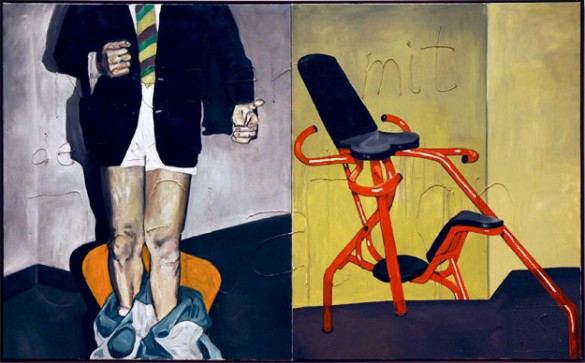
During the week in which it is revealed (though hardly a surprise) that the N.S.A. logs every phone call and email every US citizen makes, as Israeli aggression against Syria foments war, and the Imperial President appoints billionaire Penny Pritzker as Sec. of Commerce, it is useful, probably, to consider the extent to which not just the U.S. public, but even those running it, exist in this loop of amnesiac-non history, positivist banalities, and abridged narrative that delivers this “self” as purchasing engine — and as a backdrop to a new episode of “Revenge”, or wait, Pritzker is nominated, or wait, what exactly is IN the Bush library?
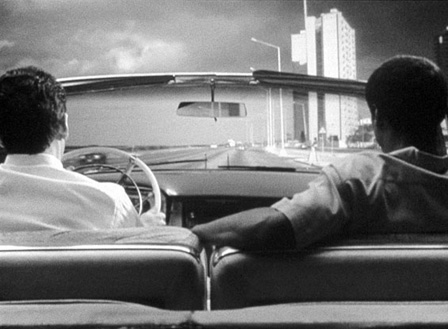
The consumer subject is marketed as heroic (if male), they know the world is “tough”, so is shopping, or rather, so is knowing WHO YOU ARE. You are the man who wears Brut, you are the man who drives a Chevy Truck, you are the sort of man who can make those tough choices on the contruction site and then go have a beer with your hearty sweaty but noble fellow workers. The consumer subject (female) is one who knows she is worth expensive items pampering to self. She is the type of woman who knows which kind of man is dumb as he tries to pick her up (pretty funny, huh? hahhahaha)….and the kind of woman who knows what it takes to be the lux model sex object for discriminating rich white men. You get the idea. None of this, absolutely NONE of this corresponds in any way to reality. What it DOES correspond to are movies and TV shows.
The images of real life are shuttered away on News Magazines (sic) or Special Reports. Nightline, 60 Minutes, Panorama, etc. And real life must be contained by those with perfect vowels (if the U.K.) or at least a resonant mid atlantic, or avuncular southern (if Natchez, not Mobile or Birmingham or Biloxi. In fact, I’m not sure the high ticket southern accent of Kentucky horse breeders or Peanut plantation owners ever existed per se until Gone With The Wind. But I digress…
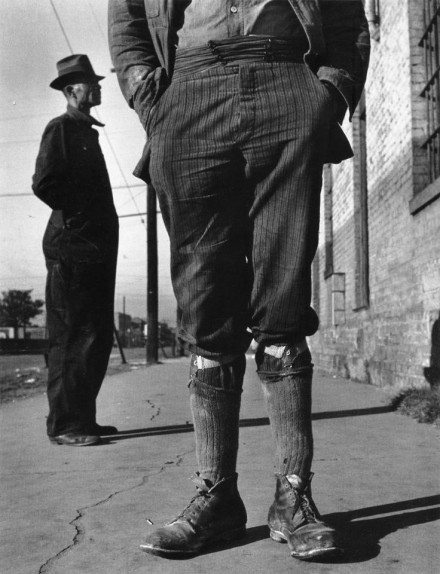
Alabama, 1937, John Gutman photographer
The enclosure of dissent is now the by product of the culture industry. There is an increasing inability to imagine global problems. Sure, there are many people who do, but all of us suffer to some degree from the narrative abridgments that comes with the loss of time to reflect, the colonizing of reflection, or day dreaming, of idleness.
The mystery of a single photograph, or the elliptical narrative of serialized photography, has been subsumed by film. And film is always expressive of its industrial production. Film (until now, and perhaps this is changing, somewhat) required managerial acumen. But the proliferation of image, of that almost constant image, undifferentiated, that has no boundary, and exists as de-fault backdrop to news, serves the increasing difficulty in grasping a global image, or just the ‘idea’ of the global. Drone strikes in Yemen conjure up what sort of image?
I continue to hear people use the word “disappointment’ when referring to Obama. Would one use that word speaking of either Clinton? I don’t think so. This is a side bar effect of the racism that is so constitutive of the American psyche. The white male hierarchical world view no longer can hold up beneath the weight of its contradictions. These are the final death spasms of white privilege, of liberal paternalism, and all that is left is to dispense disappointment. For YOU did not give me what I have come to expect. Couple this to the crisis of image — and the still photograph now reads as “memory”. And by extension as “history”. Freeze a frame, and leave it as an ersatz still photo, and the effect is to create a mimetic reading that starts with “memory”. The idea of memory. For real memory is harder and harder to access for all of us, I think. The delirium of Sirk’s pastels, the sense of libidinal repression created uninterrupted anxiety, and anxiety without anticipation. The use of melodrama as an X-ray of bourgeois frustration was the sort of filmic work that once destabilized rather than reinforced the master narrative. The pulp narratives of noir, the work of mostly German Jewish emigre directors was a counter narrative that connected, even if as a dream, with the pain and anger of the working class. Today, none of that (almost) comes out of Hollywood.
The invention of memory. This created artifact of advanced capital is a place holder where the idea of the moral once was. Moral autonomy recedes further and further into the distance, further out of reach, and kitsch storytelling is the constant, the corollary to the perma-image that is the backdrop to a life trapped on the sound stage.
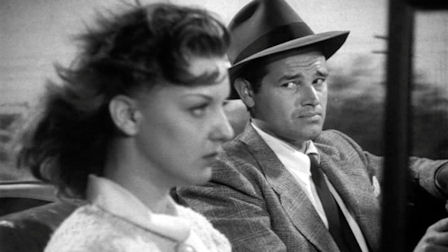
Detour, dr. Edgar G. Ulmer, 1945

Great. Thanks for this. Lot to say. As I was reading I was just feeling my own shrunken capacity to take in a lot when i got to the sentence about inability to comprehend global problems.
I have a problem with that Baudrillard, as if happens – I’d forgotten it (its what Zizek rips off with his “injunction to enjoy!”)…these kinds of comments (and Foucault did this same thing all the time too, their superficial differences apart) are so darn solipsist. These retained intellectuals living very well in France constantly kvetching int hat Heideggerian manner about the problems of the prosperous and comfortable. If this “modern man” who has all this leisure and controls so much of the world’s resources really can’t resist these mysterious imperatives to consume and enjoy himself well…cry me a river. This perspective, to worry about the empty wasted life of the privileged and not how this turns them into these little eichmans is so typical of the intellectuals of that milieu – the most materially secure, the most intellectually and physically free, clerk class ever. Doing nothing but complaining about their lack of satisfaction and the shallowness of the entertainments piped into their televisions. It reminds one that the Jacobins used the words “esclave/age” – slave/ry – a lot but only about themselves. Never about the slaves in the empire. They were les nègres. France got it’s money’s worth from its courtier intellectuals posing as so radical and writing about the tragic imperiative to dress up and eat a lot of tasty healthy foods in the capital where such things as the famine in Biafra were plotted.
I ramble.
But that aside – a lot of food for thought here…a thing I am noticing is that it is precisely this bourgeois individual who is vanishing under this culture. This bourgeois individual, the citizen of liberal democray – the adult white male for this is raced and gendered – discrete entity protecting itself by “will” from exterior influences, from suggestion, that is shown in noir in those nightmare situations where something does penetrate, something does get in from the outside, past the heat shields of the will (often through seduction by the femme fatale, who doesn’t have syphillis but that’s the tradition she arises form; Schnitzler, etc, now she has communism or a dream of revolt), this individual has been replaced by an individual, a persona, a profile, that is _supposed_ to allow the outside in, supposed to be influenced by the messages, the blandishments of advertising etc. Supposed indeed to be created by this flow. This individual is cynical not responsible, and permeable, and “networked” . In the late 19th c and modernism, the mesmerised, hypnotised patient scared the crap out of these bourgeois intellectuals – ( Conan Doyle, and Freud,) . The fact that these respectable men could be hypnotized, advertised to and given syphillis by prostitutes disturbed them in a single way. The fear of these influences marring or disrupting the integrity of the individual was combated with all kinds of insistence on ego, on truth to self, on this discrete and personal subjectivity. Now that is seen as both hokey and pathological – these bourgeois individuals of the sort Freud proposed only appear in culture product now as sociopaths (so telling, the gangster in therapy would be the cable show that signalled every genre and mass cult product should be remade as soap opera as well as sex romp). The model individual now is a kind of litcrit Lacanian persona, the notion of being spoken by language exhibited in characters ostentatiously fashioned of recycled tv.
Well, i wont argue that about baudrillard, for he is always writing from a perspective of elite whiteness. That said, he is on to something about the structural elements — and i think its not just white men, its white men & women. Its an entire class…that is disappearing…albeit the pov is male. I think there is this desperation about it all, too. This is where that “disappointment” comes from. It is this tone, that reminds me of some old British diplomat, some China hand, or near east, as he looks back on the sun as it sets on the empire. This particular historical construct has sort of literally faded away….and for some reason Im reminded of India Song, too. These disembodied voices dispassionate and reflective, but without substance. I wanted to write more, and will I think, on the relationship with idealism, or morality — the common good, and all these quaint sounding terms that have been subsumed by snark, and this adherence to the zizekian/badiou-ian aggression.
When I watch a noir, say, like Detour or the like, I feel what is getting in has to do with a genuine fear, a concrete sense that all is not right. And part of what is not right is a particular awareness of knowing you cant know. And now, you see this non-stop narrative, non stop, in which everything IS right, everything is perfect in fact. And everything is known, or about to be known (sci fi). The disruptions are all superficial. It is this weird panic i feel from this new cypher almost. And this is where I feel how the outside is obscured completely — there is no brand there to hook into. So there is gigantic blind spot (Lacanian in a sense) …butwhatever language one uses there is something being worn away, and the edifice of white supremicism, of patriarchy, has created these cultural deformities like Zizek to express this pathology, this anti humaness, and this is all that oh, you must be MORE racist, more bigoted, etc. Its interesting that these bourgeois individuals you see, as you suggest only appearing as psychopaths or something, is true, but its also this violence that accompanies it. The ultra violence of cultural product now is just hysterical. The self must be protected by a violence directed against the self. Because they appear as psychopaths but in a way also as exterminators. For they fear so deeply the outside non white world, women, the poor, etc. This what is so terrifying because the logical end of it is mass extermination. The self cannot go quietly in this sense.
Your remarks on corporate narrative bring to mind a story told by my ex husband who made a fortune off of sex chat lines in the 80’s. One of them was a “dial your fantasy line” where he discovered that the secret to making the most money was to never change the stories.
In the new season crop of Warner Bros’ CW network shows (the CW network is aimed at the youth, or people who think they still are, and folks in the boonies) the common, most striking refrain is an anti-intellectualism that goes beyond the usual disparagement of the nerd, but the enforced model of normality is always ignorant…ignorant of vocabulary over a grade three level, ignorant of scientific facts, ignorant of the world and of course history. This ignorance is equated with goodness and innocence. Dangerous characters are worldly and knowledgeable. What is left out of these moral/political discourses…for that is what they are, disguised as entertainments…is always what is most important and most incriminating to the entities that are selling them.
“because of its eighteen or twenty four frames a second [film] is inescapably beholden to a rigid expository structure” Hmmm…The enforcement of the 19th century novelistic/positivist narrative by corporate media was a choice dictated by marketing and demands of mass-culture. Even if there was some immanence in sequential frames of film, that forces film to physically exist as some proto-narrative, the formalists and other art filmmakers bring this to light and break it down just as Hollywood’s culture industry assiduously ignores any philosophical question of form.
@rita
thats so interesting on CW. Ive detected an increase in this, as well. This making of ignorance a successful battle against the sins of knowledge and education. If you can beat down the seduction of learning, you are the more heroic and strong. But i mean for a long time in Hollywood, psychiatrists are evil, but scientists are pure…unless a special aberrant case of evil scientist….one who is overreaching.
As for 24 frames a second. Yeah, i dont think thats quite right, but i do think film is expository, as a form —barbet schroeder used to discuss this with me, and the Cashiers de Cinema writers did. There is something in the image…the camera image……..that is continuous that connects to a certain sort of storytelling. All those “experimental” filmmakers linked to that Gene Youngblood (was that his name?)book seem really silly now…and unwatchable. (there are guys doing that, though…..at cal arts etc. And the book Devotional Cinema, a good book…is written by one of them….so perhaps i will have my mind changed on this….but i doubt it. http://www.nytimes.com/2012/04/15/movies/the-startlingly-beautiful-films-of-nathaniel-dorsky.html?pagewanted=all&_r=0) I mean, you cannot make a “film” that is abstract. Why is that? You can make a painting abstract or a theatre piece even…..I suppose…..i mean some of Richard Foreman is pretty close to abstract…..but film doesnt allow it. It has to do with the verisimilitude as well. (You can do things on stage……have severed penises fall from the sky, as at the end of Spurt of Blood, by Artaud… and use falling roses to symbolize it as I once saw on stage…..to represent the penises. I dont think you can do that in a film. —-anyway…..and Ive never understood why). Now those Dorsky films are of interest. But…..but……Im not sure how far one can extend that. Nor why.
I do think the anti intellectualism now is targeting (or more so) the rural christian hinterlands. I mean its useful to remember that universities teach creationism in places like Kansas, and that “liberal world view” is synonymous with sin and the fall from grace. Literally. University level.
I don’t how much this directly relates, but I wanted to say I feel there’s a place in all art for what one might cynically label “bourgeois navel gazing”, provided such art manages to pose questions about one’s own value system. Your comment about the “use of melodrama as an X-ray of bourgeois frustration” had me thinking about this. In a sense I feel it acceptable for an artist to sympathize with a member of the bourgeois class as if he or she were still a person just like everybody else. Whether one is judgmental about a homeless person or a bourgeois, one is being judgmental. Is it necessary to question middle class values? Absolutely. Is it necessary to dehumanize a couple, because they live in a 1600 square foot Haussmannian apartment in Paris? I don’t think so. I’m questioning the notion that an artist should feel obligated to dehumanize the bourgeois characters that inhabit the landscape of his or her art. Not every complacent bourgeois is a scheming imperialist. Sometimes they’re weak or simply don’t know better but are well-intentioned people at heart. On that note, I think the French filmmaker Claude Sautet is a deeply misunderstood and underappreciated chronicler of bourgeois angst overdue for in depth study. I was also wondering if your misgivings regarding Rohmer had to do with him seeming overly sympathetic to the bourgeois characters inhabiting his films. On the surface he may not seem as overtly radical as Bunuel, Pasolini, or Godard in overturning the status quo, I will admit. I feel there’s a place in art, however, for both the radicalism of a Godard or a Pasolini and the more “sympathetic” approach of someone like Rohmer. Just my two cents though.
I think one has to remember, or ask, what culture does, exactly. But before that let me point out that there is no shortage of affirmative bourgeois narrative. A work of art does not lead to revolution, thats not what it does. Even the most one dimensional agit prop doesn’t do that. Might an artwork awaken something in someone that allows them to see the world as a place in need of social change? Sure. In fact I think thats partly what it does…..it creates an idea of that which is not there (in front of us). The merely beautiful, as adorno said, and which i like to quote, is reactionary because it tacitly implies that the status quo is perfectly acceptable. Culture if it is not critical somehow, serves only the status quo. Now this all gets very tricky, and there is art made by fascists that is quite remarkable — but you dont forget that it contains, perhaps, the seed of something reactionary. Art and culture also, in some way, at least if are speaking of modernism and after, is there as a corrective to the prevailing system, and to give voice to those who usually have no voice. To make seen that which is invisible……and this is true in ways beyond the most simplistic political construct. Someone might (and many have in fact) argued that the HBO series Girls shouldn’t be attacked for being an affirmation or dissection, superficially, of rich white kids problems. I think its a very very reactionary show, a white supremicist show that reinforces a world system of oppression. This is not being overly grandiose at all. It is a vetted corporate product . Thats what it does. To elevate the discussion a bit, you can look at the novels of robert musil. Im not a big Musil fan. To me there are intelligent but bourgeois self involvement. But its open to debate, I acknowledge. But works do not always ‘say’ what the author intended. Form is not content. It is really in form that a work becomes radical. I think Broch’s Death of Virgil a more radical and profound book than Musil. The point is, though, not to be trapped in creating these personal hierarchies of competitive valuation. The end of modernism has given rise to a shifting landscape in which marketing and electronic media is so hegemonic, so all encompassing, that all opposition (or most) is too easily digested and spewed back out as its opposite. (if the form is conventional, it doesnt matter if the content is critical….its then just token opposition).This is the real project for culture — because the system has eclipsed the sense of individuality that modernism once gave voice to. It is partly why I bothered writing this blog. Because the strategies for artists now is ever more obscured and mystified. And learning to read the artwork, to recognize the appearance of allegory say, even if buried within a sea of kitsch, is important to do. Aesthetic resistance to the status quo is firstly, learning to read the status quo, and not to apologize for it. I think Remy, your remarks take content at face value in a sense, without factoring in form. Its a slippery discussion, though, and hard to define how this all works —- which is why so much is written about it. If you take a film like Killer of Sheep , charles burnett’s USC diploma film , you see a film that remains as radical as it was in 1977…if not more so. And part of that is in the form, in the absolute unfamiliarity of the entire presentation. It remains outside most discussions for this very reason. So — I suppose the summation is that creating work within a logic of domination, a system of great inequality and homogenization, means you must be ruthless and rigorous or you fall prey to the prevailing logic. 99% or more of all work created today is kitsch. And as kitsch, what I define as kitsch, it is reactionary. It is simply furthering the values of the system that is exercising this social domination on a global scale. Its there to put the audience to sleep, not to wake it up.
“This is where that “disappointment” comes from. It is this tone, that reminds me of some old British diplomat,”
yes and there is this sense of the white mentors, the protectors and mandate tutors, disapopinted in black america as a pupil being brought along in an Hegelian/evolutionary rise – you see we allowed you affirmative action and you let us down.
The disgusting Nina Power expressed that Zizney posture perfectly in her ‘book’ that all the white boys and Callinicos loved:
“The argument about getting women, ethnic minorities and homosexuals into ‘top positions’ is an argument that is currently being won by the right. Barack Obama’s recent election is perhaps a progressive hint of things to come, but it remains to be seen just how redistributive his ‘change’ will be.”
The condescension, the naïveté about what the Presidency is is in place in order to make the racist case only – the President is imagined to wield personal power only when that absurdity will help Power make the racist argument about black people’s unfitness for authority.
In the guise of this neo universalism, the “Zizek/Badiou aggresssion” as you say is to reestablish this zoology, with visions, vivid imagery, working irrationally, to see poc as defective white individuals who can aspire to improvement; implied is always their fabianism, The Island of Doctor Moreau.
But this “phallic” individualism, bourgeois citizen adulthood, proposed, threatened, and sometimes rescued/repaired in Film Noir (which is often very misogynist, though sometimes it is the opposite – say Notorious, a film I love though I hate Hitchcock generally) is debunked as the ego’s illusion, or something, babymind’s illusion of integrity and ego, but there were good and bad critiques of this …I think the Lacanian one is worse than what it took on, but we can get to that. One of the things Beller said that really grabbed me was that the individual was “an obsolete platform”. If we look at “the individual” that was constructed in the mid-Late 19th century as this discrete unit protected by a forcefield of will from outside intruders and infiltrators (and it is not the same as the Renaissance Humanist self fashioning demigod individual, who is often having to be pictured as squired and attended by a little posse and provided with a female consort…) we can see that the dominant ruling class culture is driving a passage through this imperialist democractic core individualism (the Liberal subject of rights and identity) to something first floated with fascism and fabianism, now update and souped up.
well, firstly, the Lacan thing one must remember, has about nothing at all to do with most of those writing about him…which i know you know…….but its really one of the problems with discussing Lacan, having this infestation of zizekian bullshit.
I think the ‘modern’ bourgeois individual is sort of the last bastion of a certain form of repression, as its exercised in the state domination. The mediated daily life, the marketing, all of it works, largely, because of this fear about identity. And i think we all suffer degrees of this. The fixed identity: this is what links all these various threads together. And actually, Heidegger was pretty cogent about the role of technology, and I think margaret iverson is really good on this topic in Beyond Pleasure, and in Writing Art History. It remains to be analysed though, the shift from what you call this Renaissance Humanist self, or the ‘person’ that Dante constructs, say, to Shakespeare where a new sense of doubt enters the construction, to the modern to the post modern (which doesn’t quite exist to my mind, but anyway….). And there are so many currents in this discussion……the West keeps inventing new kitsch biographies of itself…..Scientology, EST, new age whatever, and a hyper branded spirituality — because the platform (per beller) IS obsolete, and the contradictions so acute now. The inability to think past these obsolete constructions of self and society leads to a desperate doubling down (zizek and the rest, or the cruise missile left, the new white man paternalism) on the holding of power. I mean Obama’s presidency is more Imperial than any before it. The state repression, the US prison system, the militarized police over reacting to what is often their own creation — its all part of this fabric. You have this manufactured hysteria about terror etc. What you call this Liberal subject now souped up…..right…..that’s right, and its being enforced with ever greater material power. Its clear they cant build prisons quick enough. As it unravels, the need for enforcement grows…..and these new postures of “maturity”, “reasonablness”, “balance”, etc etc etc…..all of this is paternal, and based on the same model you find in colonial thinking. The absolute refusal to recognize the great majority of the planet is even out there. It is still Orientalism functioning in hyper drive. But its also more clearly than ever before I think, a purely fascist aesthetic. Politics is aestheticized (which Fascism always did) but now in this Liberal branding. “Disappointment”……I hear it over and over. And over. Except nobody is really disappointed. Not really. Because their imagination is so shrivelled in a sense, that this giant blotch, this sort of socio/historical blank space looms over the entire discourse. There is a cognitive dissonance in play — and that quote from Power (i guess) is a great example. Its a kitsch personality autopsy. Its all personality. History and the material world are only treated as signifiers for these empty intellectual games. I see it in a lot of pop culture…..whether hip hop, or film, or whatever….these corporate brands discussed as if they were outside this construction of self. Our language is so compromised that I recognize the difficulty in writing about it. But the way in which image circulates, and how fb and these social media networks further this obfuscation….not that there isnt a progressive dimension to it, but it tends to get buried beneath the volume and speed of the entire apparatus which is predicated on this model of self. And the way it works makes the creation and discussion of alternatives very difficult.
Now, a foot note on noir. Its very interesting to compare the noir films of the german directors with those of the US directors. The US directors led, logically, to jack webb and Dragnet and TV cop shows. But Siodmak and Lang and Wilder and even Preminger (a sort of special case) function very differently— or jacques tourneur…..the films of val lewton (I have write something in depth on Lewton)….are so weirdly unsettling when you see them now. And they are unsettling because they are bringing this Viennese pessimism for one thing, but also a deep distrust of the state.
@John:
I agree and sympathize with all that you say. My main point though was that art can often be misread as the opposite of what it really is. On the surface, something could seem highly conventional and complacent while in actuality it’s something else entirely. Some works are far more subtle than others, and subtlety can often be mistaken for an absence of radicalism. On a film forum I sometimes frequent there’s a member whose tastes I respect, but for some reason Mizoguchi’s films, for instance, seem nothing more than conventional melodramas to him. It’s simply a blind spot on his part. We all have them when it comes to art. Likewise, there are cinephiles for whom the aesthetics of “classic Hollywood” go right over their heads, and they can only appreciate the more obvious ‘modernism and seriousness’ of “foreign art cinema”. The same goes for people who are flattered by the ‘modern’ qualities of a Dali or a Picasso but are left bored by what they perceive to be mere photographic recreation of Vermeer or Ingres. But I digress. I think we should ask how radicalism in form should be defined. And should an artist set out to be radical or should he or she simply search for truth assuming through such a search the radicalism will produce itself even it’s not readily apparent. I also think there’s a bit of a good cop, bad cop scenario where someone like Godard or Pasolini is the bad cop while a ‘bourgeois navel gazer’ like Claude Sautet or Rohmer is a good cop. But at the end of the day they’re all cops while someone like Lena Dunham or Wynton Marsalis is a criminal. But then again, I think we’re still in the stages of determining what art’s purpose is. For instance, if one stares long enough at a painting by Van Gogh or Bonnard one might eventually perceive a falsity that helps to reveal a larger truth, and this truth goes deeper than any issue regarding class or politics. The artist doesn’t have to consciously concern him or herself with whether or not the status quo is being questioned or challenged. It’s simply revealing a truth about humanity, nature, and the world we live in, and once we’re grappling with such a truth such socioeconomic issues have perhaps already solved themselves now that people have taken a few minutes out of their day to truly grapple with and understand the world around them.
I didn’t mean to say it’s acceptable to make art that’s sympathetic to bourgeois values, but sometimes an artist may produce art that on the surface may appear to be wholly supportive and complacent in accepting such values, while in fact he or she is simply being a ‘good cop’. As I gather my thoughts I’ll try to delve more into this certainly.
Rossellini’s Voyage to Italy is a ‘good cop’ film while Godard’s Weekend is ‘bad cop’ film for instance.
First, I couldn’t possibly read this entire essay, on the computer. John you must begin an international magazine process for those of us screen-impaired (I am serious) 🙂
From what I did gather, and gathering is what it was, your analysis is incisive, although I find that you critique kitsch to the point that your critique becomes kitsch itself. Which maybe your point? As far as theatre, I would like to ask your opinion of P. Glass and R. Wilson’s “Einstein on the Beach” – which was temporally dizzying and revolutionary when I saw it (twice) last year. It started in the 1970s and has a lot of its structure from the interesting poet-writer Christopher Knowles. What do you opine?
@eilif:
Well, at the risk of becoming what i critique —-kitsch has come to be the term I used to describe that vast commercially manufactured cultural product, the electronic media, the culture industry, the corporate apparatus of marketing and propaganda as well as network TV and Hollywood film. It is that set of mechanisms that define the master narrative, as it is ever more narrowly expressed.
Its interesting that the first sentence in Dialectic of Enlightenment includes a reference to the loss of the last vestiges of pre capitalism is part of what has led to cultural chaos, which adorno and horkheimer maintain is not true, for in reality the system now imposes an absolute stamp of sameness on everything. A sort of near total homogenization.
” Under monopoly all mass culture is identical, and the lines of its artificial framework begin to show through. The people at the top are no longer so interested in concealing monopoly: as its violence becomes more open, so its power grows. Movies and radio need no longer pretend to be art. The truth that they are just business is made into an ideology in order to justify the rubbish they deliberately produce. They call themselves industries; and when their directors’ incomes are published, any doubt about the social utility of the finished products is removed.”
this is kitsch….the ideology of capital domination, expressed now under the rubric of “entertainment”, which word has replaced art. And ….when i was a boy, the box office for film was in the business section of the paper, and now its front page of the “arts & entertainment” section. As adorno says above, the system no longer pretends it is anything but a business, but what has happened is that business has been aestheticized. The “art” of capital accumulation. In any event, I suppose that was a large part of what made me want to write a blog — to teach an aesthetic resistance. WHich leads us to robert wilson.
This is too big a topic to do justice to here (though if you read the blog entry on chavez .. i talk about abramovic and to a lesser degree Wilson) but my answer is that I find wilson to be a sort of neo Wagnerian kitsch (to steal someone else’s term, I forget who) and a part of a trend toward the obliteration of text on stage. Now….this is complicated because I don’t want to dismiss Wilson, for he is far too large a figure and too talented to do that. But…….this is a theatre of spectacle, and its not an accident that he is so fascinated with autism. For if we have passed through schizophrenia, we are now in an autistic phase of late predatory capital.
Wilson is creating a theatre of non narrative — anti textuality, and within that is a strange dehumanizing that takes place. People are props in a sense, but its more than that, they are creating a false set of differences, where really the entire stage is confined within a frame that suggests the fungibility of the human — people intersect with decor in a sense. However, his effects are indeed quite startling, and I think seductive. And i think Phillip Glass is a remarkable composer. So we have this very high brow form elitist Vegas act. But this leads into my rather complicated analysis of theatre actually does. (and if you read my interview on the blog with molly klein, i speak about some of this)……for me theatre takes place off stage, largely. And the unconscious is what is off stage, and the conscious is on stage, looking, in a sense, toward the wings. As Blau said, even when there is no curtain, the theatre remembers that one was once there. Theatre did not start with religion, really, though they overlapped i think at some point, nor did it start with totemic rituals or any of that. Theatre is a form of thought…..it is a specific form of thinking that can only take place in this ritual space that is a stage. If i were to give you the “”kistch”” history of theatre i would suggest a group of cavemen talking about each day’s hunt around a camp fire and one night one of them steps away from the fire to tell his story…and all the other heads turn to watch him……and theatre is born. And what that caveman sensed, as did his audience, was that the story no longer mattered, the ‘truth’ of the hunt he was reconstructing was irrelevant…..for what mattered what something else. And that something else is linked to both our individual psychic formation, and that formation as it has been shaped by historical forces. This came up in the comments above: this idea of identity — that the modern bourgeois individual is a pretty recent invention, and that a man of Dante’s time might have developed his consciousness, as it pertains to his sense of self, quite differently. In any event…..theatre is always about something that has just escaped the stage as the lights come up and the rest of the play is spent chasing that which has fled and the climax is always melancholy for it is the recognition that it cant be caught. Jan Kott’s analysis of Lear in Shakespeare Our Contemporary is the best description I know of theatre as thought — for it is, then, by necessity, an almost Oracular presentation. It is expressing something of our own trauma, but always as a pursuit of it. I know this becomes rather obtuse and sounds a bit Heideggerian, but its not as simple as duplicating dreams (kitsch dreams by necessity again), but rather an attempt — and here language and text enter, stage right —- to create that allegorical sense of language speaking itself….as Benjamin has it. Benjamin’s Origin of German tragic Drama is very important to me. Anyway……per wilson, I think, just me, that what one gets is an elevated taste in the service of just effects. If the merely beautiful is always reactionary (Adorno) then such effects are in a sense an expression of the same mass deception as the culture industry. We are beguiled by the beauty, by the effects, but that really, on a secondary level there is only autistic numbness. Mute silence in the face of our terror, of world carnage, etc. They depoliticize in a sense, because they are just striking images…and while I understand there is a libretto, it is rendered silent….for me anyway. I have much more to say………..
apropos of……
http://www.nytimes.com/2013/05/06/business/media/solving-equation-of-a-hit-film-script-with-data.html?_r=2&
Cool post and a rich exchange. A lot to wrap my poor saturated head around. I will say that I totally agree about serial television versus film. You can get epic effects in TV maybe (The Wire)…but I don’t think you can get tragic ones. You can get Homer or Tolstoy but you can’t get Aeschylus or Dostoyevsky, in other words (and I’m not sure you can get Homer). The idea of the epic is where I totally disagree with Brecht, I suppose – epic in my view is always a friend of hierarchical power whereas the tragic, because of its relationship to Dionysian groundlessness, is always a threat to power (even when it valorizes power as Shakespeare often does). This would support the idea that Nietzsche (via the Frenchies: Bergson, Bataille, Blanchot, Foucault, and Deleuze) rather than Hegel points in the direction of radical transformation. Well, who knows – the inherent contradictions of Capitalism are certainly becoming lurid so maybe things will collapse by an inevitable dialectic after all…
Another way to view the entrancement you’re describing, John, is as a form of socergy – the capitalist sorcery Isabelle Stengers writes eloquently about. People have been “entrained…”
And Robert Wilson, yeah, in my view the CEO of the avant-garde and an embodiment of what might be called the aesthetic of resignation. That may not be entirely fair, but I hated the piece he did with Tom Waits – give me Richard Foreman or the Wooster Group over Wilson any day.
@guy:
yeah, I think thats right about the impossible tragic. You can get the grotesque, or pathos or probably epic . This is also Auerbach’s Mimesis, the famous first chapter— Homer or the King James Bible. Homer led to tolstoy and KJ led to kafka and dostoyevsky. And not really Tolstoy but Dickens and Thackery. And there seems as if a split followed german language to one side and english to the other. It happened after shakespeare somehow. So that TV and film has because of technological imperatives followed the Dickensian logic…? I dont know. But I think that Kleist and Kafka and Benn and robert walser up to Kroetz and Muller and handke suggests the legacy of the anti epic took firmer root in german language theatre. It feels now as if beckett and Pinter were the morticians of that english language cadaver. Brilliant forensic pathologists but still working on what was already dead, and that something else lived on in the german tradition. Either way, I agree the Epic was inherently conservative. For many of the same reasons I think the theatre of visual effect is inherently conservative. And why I think 99% of film is (and for other reasons having to do directly with the industrial production of the product- and with the Renaissance sense of perspective, etc.). The tragic/dionysian was always destabilizing, disunifying. For it evoked a primitive irrationality that Plato wanted to put an end to. And i think its very hard to think of anything tragic today in film or theatre. As for Wilson…..look, its not an accident he is produced where he is produced. The venue for wilson must be elitist. Its a high priced ticket, its coming from that sensibilty, the same one that has always funded court artists. Now some court artists were subversive. Is Wilson? Not to my mind. Foreman is anarchic, and comes from a place of disrupting the status quo. It is an angry shreik of madness, it is Artaud and Wilson is following on Racine probably. Must think more on this, though………….
I noticed you didn’t respond to my most recent comments, and I apologize if perhaps they seemed a bit too bold and antagonistic.
remy……im trying to keep up dude………..i appreciate the comments….i just cant get to ALL of them quickly. But do keep commenting, i wish more people would.
I am wondering if kitsch in-itself is ‘necessarily’ – bad? – problematic? or even superficial?
@eilif:
i see it as dishonest, at its core. This is sort of the Frankfurt position on the Culture Industry. Mass deception behind a promise of freedom or liberation — or transformation. Kitsch is inherently non transformative. Horkheimer (or adorno, ive heard both) said the culture industry was like psychoanlysis in reverse. It is there to put you to sleep, rather than awaken. N O W……. there are assumptions hiding in there about what we mean about awakening, and transformation. Its not simple… for there are dialectical relations involved, and we have to ask why human’s create, and are they really creating for an audience (i think yes), but we are also looking at the rise of the bourgeois individual — that identity that we include ourselves in. One cant quite psychoanlyse dante for example….whatever one thinks of psychoanalysis….because the notion of personal was different i think. Anyway…the short answer is yeah, I think its bad. But i dont feel comfortable with the word *bad*. But I think it is a reflection of an intent to manipulate — for profit, for control, and probably other reasons, too.
Automatically, Bridget thought of her former roommate,
Audrey, and then just as quickly dismissed the thought.
New York Fashion Week started last week with Fashion Night Out celebrated
globally September 10. Together with all rights and privileges appertaining to
it by the mere submission of an.